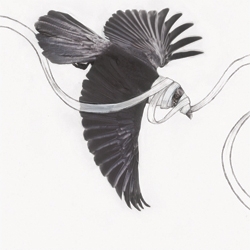Read any book featuring a few world famous guitarists who have been asked to analyze both their instrument and how they play it, and the first thing you’ll be confronted with is how conflicted their opinions are – both about their instrument and how they play it. In conversation, guitarists will usually proclaim just how simple an instrument the guitar is to play (Butthole Surfers guitarist Paul Leary once admonished this writer with the declaration that the guitar is sort of a joke of an instrument) but complain how hard it can be to coax the sounds they desire from it.
Such is the perfect contradiction that most guitarists face soon after they begin playing. David Todd’s Feeding Back illustrates that it’s the one that no one ever really resolves, even if the guitarist polled enjoys fame and fortune for his efforts.
The contradiction and quandary of how such a “simple instrument” in theory can be such a difficult one in practice is the one Feeding Back grapples with. It collects the stories and opinions of some of the most famous names in alternative rock including J. Mascis, John Frusciante, James Williamson, Wayne Kramer and Lee Ranaldo, to name only a few. While some critics would quickly question the editorial decisions which led these artists to be included while other names were overlooked, it quickly becomes obvious that the guitarists which made the proverbial cut did so by both fitting and rebelling against the paradigm that originality should come above all.
All of the guitarists included were interested in presenting themselves – not presenting a community or a scene – and cutting out a sound intended to be all their own. Sure, those sounds and styles would go on to inspire, influence or inform legions of other players but, at first, each of these guitarists were perfect originals. That, for those wondering, is how primitive and simplistic players like Lydia Lunch, Cheatah Chrome, Richard Thompson and Lenny Kaye came to be placed in these ranks next to such dynamos as Wayne Kramer, Glenn Branca, Robert Quinne and J. Mascis.
While these guitarists styles may be far less technically complicated, they are still very original. They also have some pretty interesting summations to present for their approach to the guitar and their reasoning for why their performances sound the way they do (particular standouts in that regard are those which come from James Williamson and Lydia Lunch).
What those who pick up Feeding Back will find after they’ve finished the book is that they’re filled up not with any greater idea or awareness of how to create a fantastic noise like the players whose remarks are included in the book, but they will be inspired to pick up the instrument and start trying to find their own way. Todd perfectly channels the passion that all twenty-seven of the guitarists included in the book have for the music they’ve made, but he also pushes out with the force which comes from his own enthusiasm for the music and the guitarists’ performances of it – enthusiasm which just drips out of the Q&A portions of the text.
It’s incredibly affecting. Readers shouldn’t be surprised if, after reading Feeding Back, Todd’s passion makes them want to turn up the volume on their own amplifiers and begin perpetuating the cycle.
(Chicago Review Press/A Capella/IPG)
Artist:


